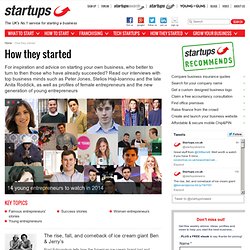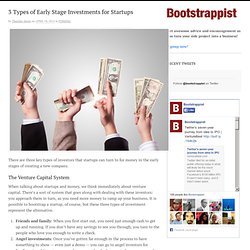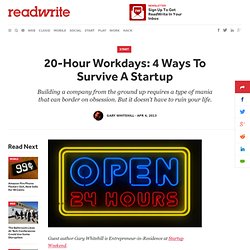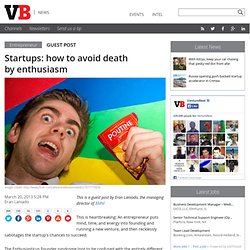

How they started. Tradespeople in UK ‘spend a week away from home per month’ Study finds traders cover more than 350 miles per month to complete jobs… Read more The Secret Entrepreneur: Screw best practice!

Sick of being told there's a right way to do things, our mystery boss gets a major bugbear off their chest… Read more. Europe's 100 hottest startups 2012: London. This article was taken from the September 2012 issue of Wired magazine.

Be the first to read Wired's articles in print before they're posted online, and get your hands on loads of additional content by subscribing online. For all the government's Tech City promotion, the Shoreditch scene has yet to produce a breakout hit to compete with Silicon Valley's best. For some entrepreneurs, the blame goes to financial institutions that are more risk-averse than their US counterparts. "As the US continues to churn out high-profile IPOs for Zynga, Groupon, LinkedIn and Facebook, the London IPO machine is eerily silent," says Neil Rimer, cofounder of Index Ventures, one of Europe's largest venture capital firms. According to analysts Price Waterhouse Coopers, notes Rimer, last year technology companies accounted for 21 per cent of the total proceeds raised by US IPOs.
Entrepreneur & UK Small Business Magazine. Personal Website of Jason L. Baptiste - Author of The Ultralight Startup and CEO of Onswipe. Hacker News. Business News & Strategy For Entrepreneurs. 3 Types of Early Stage Investments for Startups. There are three key types of investors that startups can turn to for money in the early stages of creating a new company.

The Venture Capital System When talking about startups and money, we think immediately about venture capital. There’s a sort of system that goes along with dealing with these investors: you approach them in turn, as you need more money to ramp up your business. It is possible to bootstrap a startup, of course, but these three types of investment represent the alternative. Friends and family: When you first start out, you need just enough cash to get up and running. But this system is a tough one. The Incubator Route It seems like there are incubators popping up in every major city lately (and even in some less urban areas — my county has its own incubator). What About Crowdfunding? President Obama recently signed the JOBS Act into law, basically making it legal for startups to use crowdfunding to raise up to $1 million. What funding method appeals the most to you? 20-Hour Workdays: 4 Ways To Survive A Startup. Guest author Gary Whitehill is Entrepreneur-in-Residence at Startup Weekend.

Entrepreneurs come in all shapes and sizes. But the most successful pioneers tend to share certain traits. Entrepreneurs are driven, innovative, persistent, resilient, and, as The New York Times’ David Segal suggests, just the right amount of crazy. The daunting venture of building a company from the ground up requires a type of mania, a type of desire that, on occasion, borders on obsession. An entrepreneur’s startup really is like his or her baby, demanding constant love and attention. Trace Cohen, President of Launch.it, had this to say about being a startup parent: “It's our job and privilege to do everything in our power to make sure our company grows up to be smart and strong.
This reality presents a significant challenge to both budding and seasoned entrepreneurs. 1. With all the complexity at the office, it helps to simplify your personal time. 2. 'Simple’ is good, but ‘non-existent’ is not. 3. 4. Startups: how to avoid death by enthusiasm. This is a guest post by Eran Laniado, the managing director of BMN!

This is heartbreaking: An entrepreneur puts mind, time, and energy into founding and running a new venture, and then recklessly sabotages the startup’s chances to succeed. The Enthusiasticus Founder syndrome (not to be confused with the entirely different Founderitis) occurs when novice founders, convinced that their garage gig is the next Google or Amazon, make critical mistakes due to the dangerous cocktail of inexperience and over-optimism. Unfortunately, it causes potentially great ventures to die prematurely and founders to forgo future entrepreneurial efforts.
Here are some of the common signs and symptoms. Betting the house (especially yours) Undoubtedly, entrepreneurial success depends on commitment. As Paul Graham advises: ‘don’t get your hopes up.’ Therefore, a startup founder with no more than an idea – one who has neither a minimum viable product, nor traction and real customer insights – should take caution. Tools.